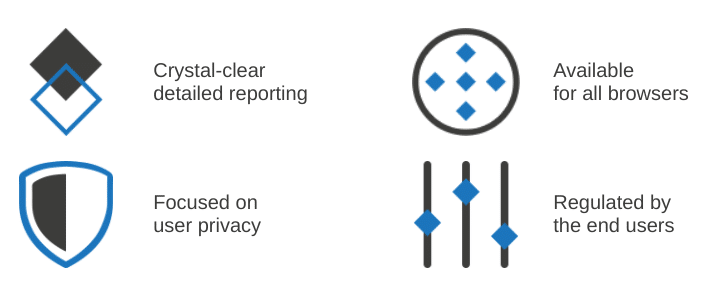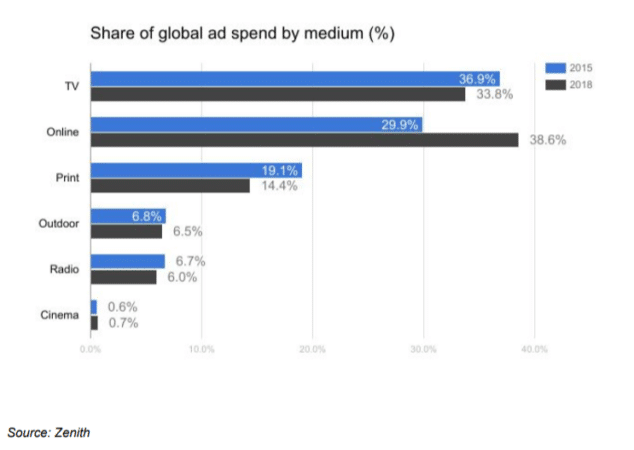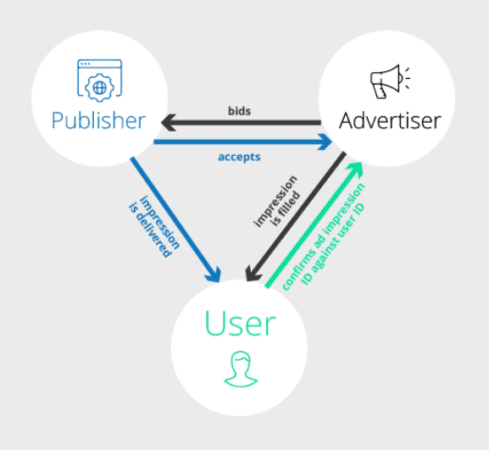Latest news about Bitcoin and all cryptocurrencies. Your daily crypto news habit.
AdEx: Decentralized Advertising Platform
AdEx (ADX) stands for “advertising exchange.” They’re building a decentralized platform where advertisers and online publishers can meet to negotiate advertising contracts. The project also includes a user portal for internet users to specify what types of ads they’d like to see and manage their profile privacy and data.
The emerging advertising exchange industry is a crowded field. AdEx is up against other blockchain projects seeking to accomplish similar goals such as Bitclave, Basic Attention Token, qChain, and adChain. AdEx’s unique angle is transparency, unrestricted access, and no fees for using their service.
Still, AdEx is a relatively unknown project. They successfully completed a token sale, but they have yet to launch a beta version of the platform. So, let’s take a deeper dive into the ad industry, AdEx’s white paper, and the project’s roadmap to get a clearer picture of what AdEx is all about.
The Current Ad Industry
It’s helpful to examine the current advertising market, especially as it relates to online media, in order to understand AdEx’s positioning.
In the past few years, online advertising has surpassed TV advertising in terms of share of advertising revenue. This is an enormous shift in the ad industry. With the decline of traditional broadcasters and increase in over-the-top providers (OTTs are content providers like Netflix, Amazon, Hulu), the trend toward digital seems like it will only continue to grow.
Online advertising now accounts for 40% of all ad spending.
Middlemen
The ad industry is rife with middlemen. In its simplest form, digital advertising has a middleman like Google Adwords. They use bidding to set the price and take a fee for every impression they handle. In more complicated schemes, there may be multiple middlemen – a publisher’s broker, an advertiser’s broker, ad agencies, etc.
These middlemen all charge fees for the simple service of connecting publishers and advertisers.
Transparency
There’s little transparency in the advertising industry. You can’t see how Adwords bidding prices are calculated. Good luck getting advertising agencies to disclose their pricing secrets.
This makes it difficult to audit the success of an advertising campaign. It also means it’s difficult to measure the quality of inbound leads from various publishers. Often, clicks on ads come from bots or disingenuous users for the sake of driving revenue to malicious publishers.
Ad Blockers & Disinterest
Users are so bombarded with advertising messages, many have installed ad-blocking browser extensions. In addition, most users are now immune to many forms of advertising. Few people click on banner ads anymore. Ads before videos get ignored or skipped.
This is a major problem for advertisers as ROI decreases for each impression they buy. The new frontier in effective advertising is the one pioneered by the likes of Facebook and YouTube and other social media outlets. They allow advertisers to target ads based on demographic criteria and users’ expressed interests so the ads are relevant and personalized to their intended audience.
How AdEx Addresses These Problems
AdEx implements a solution with three user stories: publisher, advertiser, and user. Each of these stories addresses the challenges of digital advertising from a different angle.
Publishers
Publishers are the content creators, owners, or distributors. They own the websites that users are visiting. They are the ones who can host advertisements and get paid for those ads.
The key is publishers want control over what types of ads display on their sites. AdEx helps publishers maximize revenue generation from ads while minimizing the negative impacts of ads on user experience.
Monetization Based on Clicks w/ Verification
When running ads with AdEx, each impression and click on the ad is verified to make sure it’s an authentic impression. This is bad for malicious publishers, but it’s good for the ecosystem as a whole. Since AdEx audits incoming impressions, falsely generated clicks will be punished. That drives up the value of real impressions, helping legitimate publishers make more money.
Control Over Ads
AdEx also gives publishers control over what ads run on their sites. The user interface of their decentralized app (dApp) allows publishers to turn on and off ads from various advertisers if they’re unhappy with the content portrayed on the site.
The same is also true for advertisers who also have control over whether their ads are run on various individual sites. It’s worth mentioning that this is not standard in the advertising industry today. Usually, ad packages are bundled along with an agreement. If a publisher or an advertiser doesn’t want an ad on a given site, they’d have to negotiate out of the advertising package and likely lose other sites/advertisers in the process.
Direct Contact with Advertisers
This one is big for the ad industry. Right now, middlemen largely handle all transactions and publishers don’t speak directly to advertisers. AdEx does away with the middlemen, connecting the parties directly. The result is a no-fee system where publishers can negotiate directly. All advertising costs go directly to the publishers.
Advertisers
Advertisers run their ads on hundreds or thousands of sites daily. AdEx gives them unprecedented control over who, where, and when their ads go.
ADX Tokens
When advertisers pay for an ad placement, they pay in ADX tokens. To facilitate onboarding, however, AdEx will implement a direct fiat gateway. When users cash out their ADX for fiat, the tokens will return to ADX in a cycle.
This is a major challenge for AdEx, both from a logistical and regulatory standpoint. Fiat gateways require liquidity and compliance. It’s not entirely clear yet how AdEx will implement this gateway, whether it will be proprietary or a third party. Still, this is a big question mark looming over the project.
Audience Targeting
AdEx promises to provide a high level of customizability and audience targeting for its advertisers. If successful, it could bring higher ROI to the advertising companies and make AdEx a leader in the space. So far, however, AdEx has limited user data to base its targeting off of. Collecting and developing profiles around this data is another major hurdle for the project.
No Ad Fraud
With impression and click verification, AdEx plans to reduce or eliminate fraudulent activity on the part of malicious publishers. This is another area where, if successfully implemented, AdEx could bring significant ROI to advertisers. Guaranteeing genuine impressions is a major task. It’s also a bit of an arms race. As detection methods get better, so will methods for circumventing detection.
Users
The third group AdEx is working for is internet users. AdEx will implement a portal for average users to make choices about the ads they see. The result could be more interesting advertising and sponsored content that viewers will actually want to see (or at least not actively avoid).
Ethereum & NEO-based Smart Contracts
AdEx is a decentralized app and ERC-20 currency. Originally built on Ethereum’s blockchain, AdEx is porting over to NEO.
The dApp will host an exchange for bidding on advertising space. It will also include messaging channels for negotiation and direct interaction between publishers and advertisers.
Most of the contract management and negotiation will take place off-chain in separate channels. Only the final settlement of the contract will need to take place on-chain. This makes AdEx more scalable as all contract actions don’t need to be recorded on-chain.
Media & Metadata Storage
For storage of metadata and advertising media files, AdEx will use IPFS. IPFS is a peer-to-peer solution for media management. It will integrate seamlessly with current advertising delivery channels.
AdEx also allows interoperability with existing ad storage solutions, so the switching costs of changing to AdEx remain low.
Reputation System
The AdEx dApp will also implement a reputation management system. So, users will be able to rate each other and give feedback about the trustworthiness of other users. The reputation system will work on a points structure with publishers and advertisers able to filter their options based on reputation.
Unfortunately, further details about the reputation system won’t be available until after the launch of the beta version.
Roadmap
AdEx is still in development, so it’s difficult to say much yet about it at this point. The original roadmap anticipated a beta release in February 2018. It remains to be seen if the team will meet that deadline.
Future plans for version two of AdEx after launch focus on improving the user experience and scalability. AdEx has also expressed an interest in implementing a real-time bidding solution that could take place off-chain or on a high throughput network, like IOTA.
AdEx Token (ADX)
The AdEx token currently sits in the top 150 tokens worldwide by market cap, making it a still relatively unknown project.
That said, AdEx had no trouble generating interest for its token sale in June 2017. They raised $10 million in first three hours of token sale.
ADX will be the currency that advertisers use to buy clicks/impressions within the AdEx exchange.
Where to Buy AdEx (ADX)
You can buy AdEx (ADX) on many of the major exchanges:
Where to Store AdEx (ADX)
ADX tokens are ERC-20 coins, so you can store them wherever you store your Ethereum tokens. MyEtherWallet is a popular choice, as are Trezor or Ledger hardware wallets.
Team
The AdEx team is a mix of professionals with experience in AdTech or blockchain.
The project’s founder, Ivo Georgiev, also founded the video-on-demand startup Stremio.
Although the team is relatively unknown in the crypto space, they are advised by the Wings Foundation and Bitmain Tech.
Conclusion
AdEx has its work cut out for it, entering a crowded industry with ambitious goals. If successful, the project stands to capitalize on the enormous online advertising industry. However, cautious optimism is wise here ahead of the launch of the beta platform.
The post What is AdEx (ADX)? | Beginner’s Guide appeared first on CoinCentral.
Disclaimer
The views and opinions expressed in this article are solely those of the authors and do not reflect the views of Bitcoin Insider. Every investment and trading move involves risk - this is especially true for cryptocurrencies given their volatility. We strongly advise our readers to conduct their own research when making a decision.



